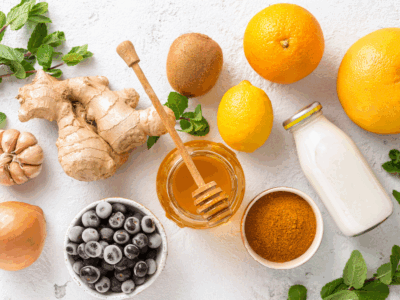Does any of this sound familiar?
You wake up in the morning with a burning sensation in your chest and throat. UGH. You know that today is going to be another difficult day.
As you start your morning routine, you feel the need to sit down and rest frequently due to the pain and discomfort. You try to eat a small breakfast, but even a few bites trigger heartburn and reflux.
Throughout the day, you continue to struggle with the constant burning sensation in your chest and throat, so you continue to pop Tums like candy.
It’s difficult to concentrate on work or enjoy your favorite activities. You feel isolated and alone in your struggle, as others around you seem to be able to eat and drink whatever they want without any issues.
You dread mealtimes, as even a small amount of food can trigger intense symptoms. You try to avoid trigger foods, but sometimes it seems like everything sets off your symptoms.
You’re just going to cancel your plans (AGAIN) and go home because you’re feeling miserable.
Living with GERD can be a daily struggle, with symptoms that impact every aspect of your life. The constant pain and discomfort can be isolating and frustrating, making it difficult to enjoy even the simplest activities.

What is GERD?
GERD, or gastroesophageal reflux disease, is a chronic digestive disorder that occurs when stomach acid flows back into the esophagus. It is thought to affect up to 20% of adults living within the United States.
This can cause irritation and inflammation of the esophageal lining, leading to symptoms such as heartburn, acid reflux, and difficulty swallowing.
Common symptoms of GERD include:
- Heartburn
- Acid reflux
- Regurgitation (the sensation of stomach acid or food coming back up into the mouth)
- Difficulty swallowing
- Chest pain
- Hoarseness or sore throat
- Chronic cough
Root Causes of GERD
GERD can be a complex condition, and the root causes can vary from person to person. However, here are five potential root causes of GERD:
- Lower Esophageal Sphincter (LES) Dysfunction
- Hiatal Hernia
- Dietary Factors
- Certain medications
- High or low stomach acid (usually low)
Lower Esophageal Sphincter (LES) Dysfunction
Lower Esophageal Sphincter (LES) Dysfunction is a common cause of GERD. The LES is a muscular ring at the bottom of the esophagus that normally prevents stomach acid and food from flowing back up into the esophagus.
However, if the LES becomes weakened or doesn’t function properly, it can allow stomach acid to flow back into the esophagus, leading to the symptoms of GERD.
There are several factors that can contribute to LES dysfunction, including:
- Hiatal Hernia: A hiatal hernia occurs when the upper part of the stomach bulges through the diaphragm and into the chest. This can cause the LES to become displaced, leading to reflux of stomach acid into the esophagus.
- Obesity or Excess Weight: Being overweight or obese can put pressure on the stomach, causing the LES to weaken or become displaced. This can increase the risk of acid reflux and GERD.
- Pregnancy: Hormonal changes during pregnancy can cause the LES to relax, allowing stomach acid to flow back into the esophagus.
- Certain Medications: Certain medications, including some antidepressants, antihistamines, and blood pressure medications, can weaken the LES or irritate the esophagus, leading to GERD symptoms.
- Aging: The LES can become weaker with age, increasing the risk of acid reflux and GERD.
Hiatal Hernia
A Hiatal Hernia is a condition where a portion of the stomach protrudes up through the diaphragm into the chest cavity.
This can weaken the lower esophageal sphincter (LES), which is the muscular ring that normally prevents stomach acid and food from flowing back up into the esophagus. When the LES is weakened, it can allow stomach acid to flow back into the esophagus, leading to the symptoms of GERD.
Here’s how a Hiatal Hernia can contribute to GERD:
- LES Dysfunction: A hiatal hernia can weaken the LES and make it less effective in preventing stomach acid from flowing back up into the esophagus. This can lead to acid reflux and GERD symptoms.
- Increased Pressure in the Abdomen: A hiatal hernia can increase pressure in the abdomen, which can force stomach acid up into the esophagus. This can also contribute to the development of GERD.
- Delayed Stomach Emptying: In some cases, a hiatal hernia can slow down the movement of food from the stomach into the small intestine. This can cause food and stomach acid to sit in the stomach for longer periods of time, which can lead to an increased risk of acid reflux and GERD symptoms.
Dietary Factors
Dietary factors can play a significant role in the development of GERD. Here are a few ways that dietary factors can impact GERD:
- Trigger Foods: Certain foods can trigger GERD symptoms by causing the lower esophageal sphincter (LES) to relax or by irritating the esophagus. Common trigger foods include fatty or fried foods, chocolate, caffeine, alcohol, spicy foods, and acidic foods like tomatoes or citrus fruits. Limiting or avoiding these trigger foods can help reduce GERD symptoms.
- Portion Size: Eating large meals or overeating can put pressure on the LES and increase the risk of acid reflux. Eating smaller, more frequent meals can help reduce the risk of GERD symptoms.
- Timing of Meals: Eating close to bedtime or lying down after a meal can increase the risk of acid reflux and GERD symptoms. It’s recommended to wait at least 2-3 hours after a meal before lying down, and to avoid eating within 2-3 hours of bedtime.
Certain Medications
Certain medications can contribute to the development of GERD. Here are a few ways that medications can impact GERD:
- Medications that Relax the Lower Esophageal Sphincter (LES): The LES is a muscular ring that controls the opening and closing of the lower end of the esophagus. Medications that relax the LES can increase the risk of acid reflux and GERD symptoms. Examples of medications that may relax the LES include some calcium channel blockers, nitrates, and certain types of asthma medications.
- Medications that Irritate the Esophagus: Some medications can irritate the lining of the esophagus, leading to inflammation and GERD symptoms. Examples of medications that may irritate the esophagus include aspirin, nonsteroidal anti-inflammatory drugs (NSAIDs), and some antibiotics.
- Medications that Increase Stomach Acid Production: Certain medications can increase the production of stomach acid, which can increase the risk of acid reflux and GERD symptoms. Examples of medications that may increase stomach acid production include some pain medications, such as ibuprofen and naproxen, and some antibiotics.
- Medications that Delay Stomach Emptying: In some cases, medications can slow down the movement of food from the stomach into the small intestine. This can cause food and stomach acid to sit in the stomach for longer periods of time, which can lead to an increased risk of acid reflux and GERD symptoms. Examples of medications that may delay stomach emptying include some narcotics and some medications used to treat diabetes.
It’s important to note that not all medications will cause GERD symptoms, and that individual cases may have multiple contributing factors. If you are experiencing GERD symptoms and are taking medications, it’s important to consult with a healthcare provider to determine if the medications may be contributing to the symptoms and develop an appropriate treatment plan. Never start or stop any medications without first talking with your provider.
High or Low Stomach Acid
High Stomach Acid
While low stomach acid is commonly associated with GERD, high stomach acid can also contribute to the development of GERD. Here’s how:
When there is excess stomach acid, it can irritate the esophagus and cause inflammation, leading to the symptoms of GERD. The excess acid can cause the lower esophageal sphincter (LES) to weaken, allowing stomach acid to flow back into the esophagus.
Additionally, high levels of stomach acid can increase the pressure in the stomach, which can also force the LES open and lead to acid reflux. This can cause damage to the esophageal lining and contribute to the development of GERD.
Certain factors can cause an increase in stomach acid production, such as stress, certain medications, and some medical conditions.
Stress can trigger the release of hormones that increase stomach acid production, while certain medications such as aspirin or nonsteroidal anti-inflammatory drugs (NSAIDs) can irritate the stomach and increase acid production. Medical conditions such as Zollinger-Ellison syndrome, which causes the stomach to produce too much acid, can also contribute to the development of GERD.
Low Stomach Acid
Contrary to what you might expect, low stomach acid can actually contribute to the development of GERD. Here’s how:
When there is insufficient stomach acid, the food you eat may not be properly digested. This can cause food to remain in the stomach for longer periods of time, which can lead to overproduction of stomach acid to compensate.
This overproduction can cause an increased pressure in the stomach, which can then force the lower esophageal sphincter (LES) open and allow stomach acid to flow back into the esophagus. This can cause irritation and inflammation of the esophageal lining, leading to the symptoms of GERD.
Additionally, low stomach acid can lead to an overgrowth of harmful bacteria in the stomach and small intestine. This can cause the release of gasses that can increase the pressure in the stomach, leading to reflux of stomach acid into the esophagus.
Low stomach acid can also lead to poor digestion of protein, which can lead to the production of certain byproducts such as ammonia and other toxic substances that can further irritate the esophagus and contribute to the development of GERD.
GERD Relief
Now let’s chat about what to do in order to get relief and hopefully eliminate these frustrating symptoms, ok?
Living with GERD can be a daily struggle, with symptoms that impact every aspect of your life. The constant pain and discomfort can be isolating and frustrating, making it difficult to enjoy even the simplest activities. But I promise there is hope! Here are several at home lifestyle changes that you can begin making to help alleviate symptoms:
Avoid Trigger Foods: Identify and avoid foods that trigger GERD symptoms, such as spicy foods, fatty or fried foods, chocolate, caffeine, alcohol, and acidic foods.
Avoid Lying Down After Meals: Wait at least 2-3 hours after eating before lying down, and avoid eating within 2-3 hours of bedtime.
Elevate the Head of the Bed: Raising the head of the bed by 6-8 inches can help reduce the risk of acid reflux and improve sleep quality.
Support Your Digestion: There are many ways to improve your digestive habits which can bring great relief. Check out these tips that you can put into practice today!
Quit Smoking: Smoking can increase the risk of GERD and damage the esophagus. (And yeah, stop smoking for a lot of reasons…)
Manage Stress: Stress can contribute to GERD symptoms. Engage in stress-reducing activities such as yoga, meditation, or deep breathing exercises. Also check out Neuro Emotional Technique.
Wear Loose Clothing: Tight clothing can increase pressure on the stomach and LES, contributing to GERD symptoms. Wear loose-fitting clothing to reduce pressure on the stomach.
Avoid Large Meals: Eating large meals or overeating can put pressure on the LES and increase the risk of acid reflux. Eat smaller, more frequent meals to reduce the risk of GERD symptoms.
Work With A Natural Health Practitioner: If you are experiencing GERD symptoms and want to get to the root of it all, consult with a natural health practitioner to determine the underlying cause and develop an appropriate treatment plan.
—> Ready to toss the Tums for good? Apply to work with me and let’s get you feeling better ASAP!









